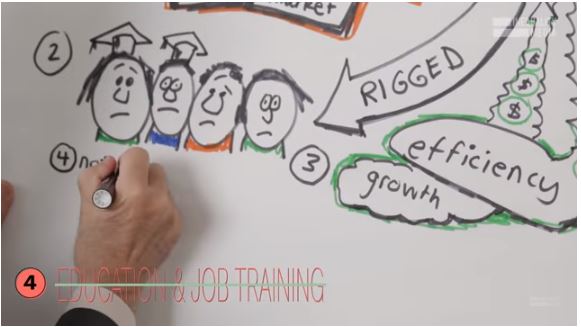This morning I read Robert Reich long blog post titled “Everything You Need to Know About the New Economy” that in my humble opinion was misnamed. It should have been titled “This is why and how we return America’s economy to its people.
Reich first identifies the core of the problem.
The biggest economic story of our times isn’t about supply and demand. It’s about institutions and politics. It’s about power. The median annual earnings of full-time wage and salaried workers in 1979, in today’s dollars, was $43,680. The median-earnings in 2018 was $45,708. If between 1979 and 2018, the American economy almost tripled in size, so where did the gains go? Most went to the top.
He explains on his term a reality many Progressives have been articulating. The market economy is not divine but human-made and as such it follows rules “we” define. If those rules are created by a few intended on maximizing the wealth of the few at the expense of the others, we get what we have economically today.
Conventional wisdom attributes the widening economic divide to globalization and technological change – the “inevitable” result of the invisible hand of the so-called “free market.”
The conventional story isn’t completely wrong, and education and training are important. But the conventional view leaves out some of the largest and most important changes and therefore overlooks the most important solutions. To understand what really happened, it’s critical to understand that there is no “free market” in nature. The term “free market” suggests outcomes are objectively fair and that any “intervention” in the free market is somehow “unnatural.” But in reality, markets cannot exist without people constructing them. Markets depend on rules, and rules come out of legislatures, executive agencies, and courts. The biggest political change over the last four decades is the overwhelming dominance of big money in politics – influencing what those rules are to be.
Reich then gets historical as he points out that capitalism was kept in check in the past because of sources of countervailing powers like unions, state and local banks, farm cooperatives, small retail chains, etc. Of course as a purchased government allowed all those forces to be taken over by the Plutocracy, we completely imbalanced the system that degraded to our current state.
So how do we take back control? Robert Reich posits in an easy to understand manner what Progressive activists have been attempting to execute for some time now.
Stop assuming that all that’s needed is better education and job training. Sure, Americans need access to better schools and skills, but the basic problem isn’t simply a “skills gap.” It’s a market that’s organized to push more income and wealth toward the top, rather than distribute it broadly. Stop aiming to “redistribute” from richer to poorer after the market has distributed income. Instead, change the organization of the market so that a fair pre-distribution occurs inside it. Stop thinking that the goal is only to create more jobs. America’s real jobs crisis is a scarcity of .
What I found very refreshing is that Reich did not forget a very important point which is also an integral part of the Green New Deal. Moreover, he understands how the Plutocracy uses the tenets of race and culture to divide for an ulterior motive.
Don’t let the moneyed interests divide and conquer along racial and gender lines. Racism and sexism are very real issues within our economic system, and they are often exploited to keep us from realizing the power we can have when we stand together. All are disempowered by the moneyed interests, and all have a stake in rebuilding countervailing power.
It is not just about complaining about what is wrong. He points out that we must offer “a Compelling Set of Ideas about What Should be Done with Countervailing Power.”
- A guaranteed basic income so no one is impoverished,
- A guaranteed job so everyone can get ahead,
- A progressive wealth tax to pay for these and other basics,
- Stronger unions so workers have more bargaining power,
- New forms of corporate organization so workers have more voice,
- A Green New Deal so workers can get better jobs while fighting climate change.
- Reinvigorated antitrust so concentrations of economic power are broken up,
- Election finance reforms to get big money out of politics and end the revolving door,
- Voting reforms so votes cannot be suppressed.
Reich points ends with the importance of organizing and leadership in the movement. There is a place for everyone.
The key to organizing and mobilizing is creating a leadership team, and then reaching out systematically to others, giving them tasks and responsibilities, starting small and gaining a few victories so people can feel their power, and then growing from there. You’ll need to be patient and steadfast. Keep people together and focused. And be careful not to burn out. Organizing and mobilizing is hard, but once organized and mobilized, there’s no end to what people can accomplish.
You can also be a leader by uncovering critical information, fighting lies, spreading the truth. Core responsibilities of leadership are revealing the facts about widening inequalities of income, wealth, and political power – and uncovering their consequences. A century ago they were called “muckrakers.” More recently, investigative reporters. I’m talking about courageous journalists who speak truth to power.
But this form of leadership isn’t limited to reporters. It includes whistleblowers, who alert the public to abuses of power. And here courage is also required because when you blow the whistle on the powerful, the powerful sometimes strike back. This form of leadership also includes researchers, who dig up new sources of data and analyze them in ways that enlighten and motivate.
Robert Reich hits the nail on the head. This was a very welcomed read this morning.

